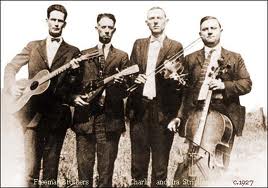Annotation:Lost Child (The): Difference between revisions
m (Text replacement - "Century Gothic" to "sans-serif") |
No edit summary |
||
| Line 1: | Line 1: | ||
{{TuneAnnotation | |||
|f_tune_annotation_title=https://tunearch.org/wiki/Annotation:Lost_Child_(The) > | |||
|f_annotation='''LOST CHILD, THE.''' American, Reel (irregular time). USA, Alabama. A Major. AEac# tuning (fiddle). ABBCD. "Lost Child" features pizzicato, or plucked notes. Charles Wolfe says the tune was well known in central Alabama in the 1930's, and is the precursor to the popular bluegrass tune "[[Black Mountain Rag]]" (Charles Wolfe, '''The Devil's Box''', Dec. 1982, p. 3-12). Elsewhere it has been reported as common in western Alabama, in the Tombigbee-Warrior region (Joyce Cauthen, '''With Fiddle and Well-Rosined Bow''', 1989), and it is one of the tunes listed in S.M. Taylor's 1925 master's theses called "A Preliminary Survey of Folk-Lore in Alabama." It was learned by the Stripling Brothers [http://www.arts.state.al.us/actc/compilation/wolves.html] from a fiddling neighbor in Alabama named "Uncle Plez" Pleasant C. Carroll (1850-1930), although fiddler Charlie Stripling added the pizzicato for contest playing, explaining: "I'd take my middle finger and knock the double shuffle on the strings" (Robert Fleder, 1971). It was one of his two favorite contest pieces, and was the very first tune (along with "[[Annotation:Big_Footed_N....r_(in_the_Sandy_Land)_(1)]]") recorded by the Stripling brothers, in Birmingham, Alabama in 1928. "The Lost Child" was also in repertory of Alabama fiddler Monkey Brown (1897-1972). | |||
'''LOST CHILD, THE.''' | |||
[[File:stripling.jpg|400px|thumb|left|The Stripling Brothers with the Freeman Brothers]] | [[File:stripling.jpg|400px|thumb|left|The Stripling Brothers with the Freeman Brothers]] | ||
|f_source_for_notated_version= | |||
|f_printed_sources=Reiner & Anick ('''Old Time Fiddling Across America'''), 1989; p. 117. | |||
|f_recorded_sources=County 401, "The Stripling Brothers: Old Time Fiddle Tunes 1928-1936." County 507, The Stripling Brothers - "Old Time Fiddle Classics." County 790, Leftwich & Higginbotham - "No One to Bring Home Tonight" (1984). Document DOCD-8007, "The Stripling Brothers, Complete Recorded Works, vol. 1 (1928-1934)." Dorian Discovery DIS-80103, Helicon - "Horizons" (1992). Vocalion 5321 (78 RPM), Stripling Brothers (Alabama) {1928}. | |||
|f_see_also_listing=Jane Keefer's Folk Music Index: An Index to Recorded Sources [http://www.ibiblio.org/keefer/l12.htm#Losch]<br> | |||
Jane Keefer's Folk Music Index: An Index to Recorded Sources [http://www.ibiblio.org/keefer/l12.htm#Losch]<br> | |||
Hear the Stripling Brother's 1928 recording on youtube.com [http://www.youtube.com/watch?v=q8-lRqhQSEM] and at Slippery Hill [https://www.slippery-hill.com/recording/lost-child]<br> | Hear the Stripling Brother's 1928 recording on youtube.com [http://www.youtube.com/watch?v=q8-lRqhQSEM] and at Slippery Hill [https://www.slippery-hill.com/recording/lost-child]<br> | ||
Hear the Stripling Brother's 1928 recording at the Internet Archive [http://ia600202.us.archive.org/15/items/LostChild/LostChild.MP3]<br | Hear the Stripling Brother's 1928 recording at the Internet Archive [http://ia600202.us.archive.org/15/items/LostChild/LostChild.MP3]<br> | ||
}} | |||
---- | ------------- | ||
Latest revision as of 03:34, 16 June 2020
X:1 T:Lost Child S:The Stripling Brothers M:C| L:1/8 R:Reel N:AEac# tuning (fiddle) F:https://www.slippery-hill.com/recording/lost-child Z:Transcribed by Andrew Kuntz K:A O[A,3E3]fe2e2|cefc e4|[E2A2]ff ee [cc][cc]|[cc][cc][Bc]-[cc]A4| [A,2E2][cf][cf] [c2e2][cc][cc]|[cc][cc](fc) [c4e4]| [c2c2][cc]f [ce]d+slide+[c2c2]-|[cc][cc] [Bc]-[cc] [A4c4]|| [cc][cc][cc][cc] [c2c2]+slide+[c2c2]-|[cc]([Ac][Bc][cc]) [A4c4]|{B}[c2c2][cc][cc] [cc][Bc2][Ac][Ac]|AA(FA) [E4A4]| [c2c2][cc][cc] [c2c2]+slide+[c2c2]-|[cc]([Ac][Bc][cc]) [A4c4]|{B}[c2c2][cc][cc] [cc][Bc2][Ac][Ac]|AA(FA) [E4A4]|| "+"c2[E2A2]"+"c2[E2A2]|[M:6/4]"+"c2+slide+[c3c3][Bc] AA[F2A2][E2A2]|[M:C|]"+"c2[E2A2]"+"c2[E2A2]|"+"c2+slide+[c3c3][cc] [cc][cc] (B/c/B)[A2c2]| "+"c2[E2A2]"+"c2[E2A2]|[M:6/4]"+"c2+slide+[c3c3][Bc] AA (F/G/F) [E2A2]|[M:C|]"+"c2[E2A2]"+"c2[E2A2]|cBAF (F/G/F) E2| "+"c2[E2A2]"+"c2[E2A2]|cBAF (F/G/F) E2|"+"c2[E2A2]"+"c2[E2A2]|cBAF (F/G/F) E2|| A,A,[A,E]A, A,A,[A,E]A,|cBAF (F/G/F) E2|A,A,[A,E]A, A,A,[A,E]A,|cBAF (F/G/F) E2| A,8-|A,8-|A,4|D8-|D8| C8|B,8|C6B,2|D8|C2B,2B,2B,2O||
LOST CHILD, THE. American, Reel (irregular time). USA, Alabama. A Major. AEac# tuning (fiddle). ABBCD. "Lost Child" features pizzicato, or plucked notes. Charles Wolfe says the tune was well known in central Alabama in the 1930's, and is the precursor to the popular bluegrass tune "Black Mountain Rag" (Charles Wolfe, The Devil's Box, Dec. 1982, p. 3-12). Elsewhere it has been reported as common in western Alabama, in the Tombigbee-Warrior region (Joyce Cauthen, With Fiddle and Well-Rosined Bow, 1989), and it is one of the tunes listed in S.M. Taylor's 1925 master's theses called "A Preliminary Survey of Folk-Lore in Alabama." It was learned by the Stripling Brothers [1] from a fiddling neighbor in Alabama named "Uncle Plez" Pleasant C. Carroll (1850-1930), although fiddler Charlie Stripling added the pizzicato for contest playing, explaining: "I'd take my middle finger and knock the double shuffle on the strings" (Robert Fleder, 1971). It was one of his two favorite contest pieces, and was the very first tune (along with "Annotation:Big_Footed_N....r_(in_the_Sandy_Land)_(1)") recorded by the Stripling brothers, in Birmingham, Alabama in 1928. "The Lost Child" was also in repertory of Alabama fiddler Monkey Brown (1897-1972).


